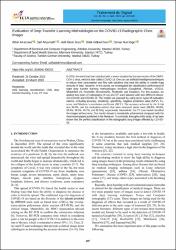| dc.contributor.author | Duru, Dilek Göksel | |
| dc.contributor.author | Duru, Adil Deniz | |
| dc.contributor.author | Uçan, Osman Nuri | |
| dc.contributor.author | Al-azzaw, Athar | |
| dc.contributor.author | Al-jumaili, Saif | |
| dc.date.accessioned | 2024-04-04T21:06:26Z | |
| dc.date.available | 2024-04-04T21:06:26Z | |
| dc.date.issued | 2023 | en_US |
| dc.identifier.citation | Duru, Dilek G., Duru, Adil D., Uçan, Osman N., Al-azzaw, A., Al-jumaili, S. (2023). Evaluation of deep transfer learning methodologies on the COVID-19 radiographic chest images. International Information and Engineering Technology Association, 40 (2), 407-420. | en_US |
| dc.identifier.uri | https://hdl.handle.net/20.500.12846/1039 | |
| dc.description.abstract | In 2019, the world had been attacked with a severe situation by the new version of the SARSCOV-2 virus, which is later called COVID-19. One can use artificial intelligence techniques
to reduce time consumption and find safe solutions that have the ability to handle huge
amounts of data. However, in this article, we investigated the classification performance of
eight deep transfer learning methodologies involved (GoogleNet, AlexNet, VGG16,
MobileNet-V2, ResNet50, DenseNet201, ResNet18, and Xception). For this purpose, we
applied two types of radiographs (X-ray and CT scan) datasets with two different classes:
non-COVID and COVID-19. The models are assessed by using seven types of evaluation
metrics, including accuracy, sensitivity, specificity, negative predictive value (NPV), F1-
score, and Matthew’s correlation coefficient (MCC). The accuracy achieved by the X-ray
was 99.3%, and the evaluation metrics that were measured above were (98.8%, 99.6%,
99.6%, 99.0%, 99.2%, and 98.5%), respectively. Meanwhile, the CT scan model classified
the images without error. Our results showed a remarkable achievement compared with the
most recent papers published in the literature. To conclude, throughout this study, it has been
shown that the perfect classification of the radiographic lung images affected by COVID19. | en_US |
| dc.language.iso | eng | en_US |
| dc.publisher | International Information and Engineering Technology Association | en_US |
| dc.relation.isversionof | 10.18280/ts.400201 | en_US |
| dc.rights | info:eu-repo/semantics/openAccess | en_US |
| dc.subject | Deep learning | en_US |
| dc.subject | Classification | en_US |
| dc.subject | CNN | en_US |
| dc.subject | X-ray | en_US |
| dc.subject | CT scan | en_US |
| dc.title | Evaluation of deep transfer learning methodologies on the COVID-19 radiographic chest images | en_US |
| dc.type | article | en_US |
| dc.identifier.volume | 40 | en_US |
| dc.identifier.issue | 2 | en_US |
| dc.relation.publicationcategory | Makale - Uluslararası Hakemli Dergi - Kurum Öğretim Elemanı | en_US |
| dc.contributor.department | TAÜ, Fen Fakültesi, Moleküler Biyoteknoloji Bölümü | en_US |
| dc.identifier.startpage | 407 | en_US |
| dc.identifier.endpage | 420 | en_US |

















